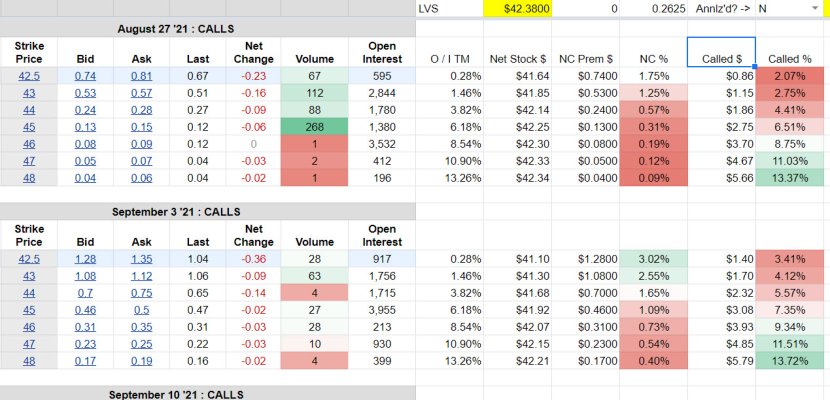bobandsherry
Thinks s/he gets paid by the post
- Joined
- Nov 24, 2015
- Messages
- 2,694
Lest people think writing covered calls is a sure way to make money or to beat the market, I will show this simple example that I have made before in another thread. You will see that success is not guaranteed.
Just to level set, I will say I'm not an expert on options, I've paid my "tuition" at the school of hard knocks along the way but started small so kept my "tuition" cost low. I learned a lot over the past couple of years on covered calls and consider I'm always learning. Compared to other option strategies, Covered Calls are low-risk.
You do make a good point, no one pays you a premium without risk. With a buyer and seller on each side of the transaction, one of you will be right, the other wrong.
However, I want to point out that I view your example is a single "play" in a series of downs and that may make up a longer-term game. I'd view there's game left.
For "A", one would have to decide if "A" increase was short-term or not. If it was short-term, it may be possible to roll that to a longer expiration let the stock can settle back to $100. Or you could then let it get assigned and write a Put at $100, pocket a premium and wait for it to get back to $100. Or you get back in the game, rebuy the stock, write another CC (which could also cover your $100 "loss") and keep moving on with the stock. You might want to re-assess your strategy for setting a strike price. I look at strike price being set as what I might consider if I were to set a limit price, but then getting rewarded with a premium. So, I could make a point that the $100 "loss" isn't really a "loss" due to writing a covered call, but instead due to your own calculated exit price. Like how many of us haven't sold a stock and continue to see it go up in price?

Something else to consider is once stock price popped higher, you might look to sell a Put with same price and expiration as your Call. You pocket a premium for this which can soften that "loss".
For "B", similar decision point, is this drop short-term or not. If short-term it's possible to hold and write another option, pocket the premium and wait for the stock to recover your "loss". If you think this is a longer term drop then that would be your decision regardless if this were a covered call transaction, you still have the premium in your pocket. And as I had mentioned before, it's possible to ride the stock price down yet still pocket a premium that makes it profitable.
But to your point, a covered call doesn't allow you to be reckless. Don't just go for a high premium, the larger the premium, the higher the chance is you'll be assigned. Still need to do due diligence. Should continue to follow similar strategy that you use for your overall portfolio. For me, I typically avoid writing a CC that extends into an earnings release date. I also usually avoid calls for periods with dividends (or be sure to factor). I also only write CC on stocks I would want to continue to own.

